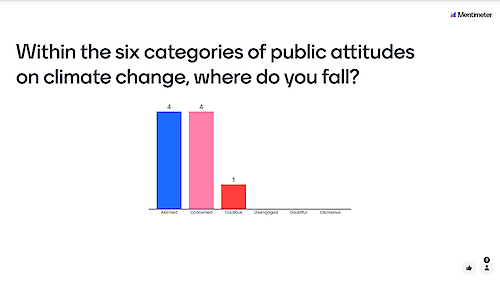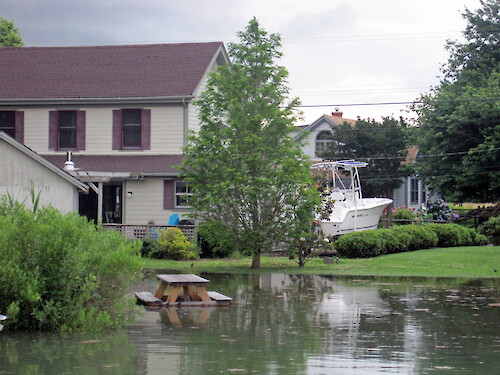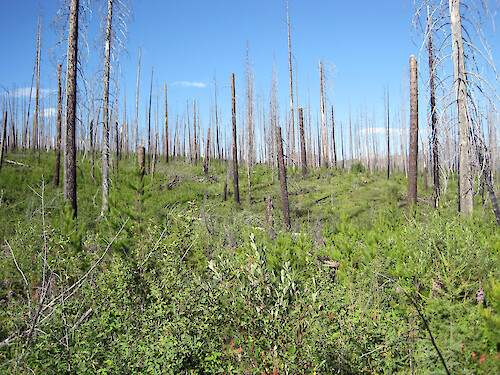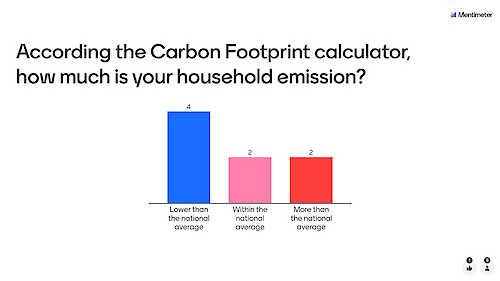Diverging Attitudes and Converging Dangers of Climate Change
Gage Jacobs · 7 commentsOf all the problems facing the environment in the modern day, none are as disastrous as climate change. Differing attitudes on the issue have caused it to become a highly politicized problem. These attitudes can be grouped into the following categories: alarmed, concerned, cautious, disengaged, doubtful, and dismissive.

The only attitudes present are alarmed, concerned, and cautious.These polling results are to be expected from students from a Science for Environmental Management class. However, outside of this bubble of environmental specialists, public opinions on climate change are varied. Dismissive attitudes can be attributed to science denial. This is not a new problem, but one that has persisted throughout the lifetime of science as a field. Science denial is defined as unwillingness to believe in existing scientific evidence1. This problem does not only apply to climate change and environmental phenomena, but to any aspect of science. Disengaged attitudes can be caused by lack of security in one’s life. It’s hard to worry about the climate’s stability if a person does not have stability in their own life.
Despite the variety of attitudes on the matter, climate change still affects the planet. We see the effects of it across the globe and in our own home state. In class discussion, we compiled negative impacts of climate change on different areas of the world. From Maryland coasts, Maryland mountains, New Jersey pine barrens, all the way to Lagos, Nigeria. The issues facing these regions converged in many ways.

Flooding, Eastern Shore, MD by Jane Hawkey is licensed under CC BY-SA 4.0
Problems facing our case studies commonly included sea level rise and flooding, erratic weather patterns, drought and wildfires, and increased temperatures. Each of these issues poses their own dangers and opportunities for management. Coastal flooding and sea level rise are especially detrimental thanks to the ever-growing coastal zone population. It’s been shown that roughly a third of all coastal populations live within the 100-year flood plain, and this number is only projected to increase2. Coastal flooding impacts developing coastal nations disproportionately than countries that have the funding to construct preventative infrastructure.
As if flooding were not enough, the frequency of wildfires has increased as well. Recent fires in northern Virginia, Canada, and Australia shine as red-hot warning signs. As climate change drives shifts in weather patterns, many of earth’s ecosystems experience droughts more frequently. Global fire potential has increased in the last few decades, which has been linked to anthropogenic climate change3. In places like the NJ pine barrens, wildfires are important to the life cycle of endemic plants. However, with rising frequencies, even these barrens are in danger of burning out completely.

Other erratic weather conditions threaten the biodiversity of the world. In places like Western Maryland, earlier warm temperatures can interfere with the biological timing of plants and animals. High temperatures in early spring can cause plants to bloom, only to be pruned by frost when the weather briefly returns to a typical temperature.

So how can we manage the changing climate? The immediate solution seems to be a reduction in emissions. A class poll based on a calculator for carbon footprints showed that most of us were at or below the national average for emissions. This comes with the same grain of salt as the attitudes poll—we are an Environmental Management class. Not everyone shares the same attitude; many people are “stuck in their ways”. Engaging others outside of this realm of academia must be done in a way that not only is informative but addresses the issues our planet faces.
Sources
1. Björnberg, K. E., Karlsson, M., Gilek, M., & Hansson, S. O. (2017). Climate and environmental science denial: A review of the scientific literature published in 1990–2015. Journal of Cleaner Production, 167, 229-241. https://www.sciencedirect.com/science/article/pii/S0959652617317821
2. Neumann, B., Vafeidis, A. T., Zimmermann, J., & Nicholls, R. J. (2015). Future coastal population growth and exposure to sea-level rise and coastal flooding-a global assessment. PloS one, 10(3), e0118571. https://journals.plos.org/plosone/article?id=10.1371/journal.pone.0118571&utm_source=miragenews&utm_medium=miragenews&utm_campaign=news
3. Ellis, T. M., Bowman, D. M., Jain, P., Flannigan, M. D., & Williamson, G. J. (2022). Global increase in wildfire risk due to climate‐driven declines in fuel moisture. Global change biology, 28(4), 1544-1559. https://www.researchgate.net/profile/Todd-Ellis-4/publication/356415980_Global_increase_in_wildfire_risk_due_to_climate-driven_declines_in_fuel_moisture/links/653e27c30426ef6369e8aacd/Global-increase-in-wildfire-risk-due-to-climate-driven-declines-in-fuel-moisture.pdf
About the author
Gage Jacobs

Gage Jacobs is a first-year master’s student in the Master in Environmental Management in Sustainability program through Frostburg State University in collaboration with University of Maryland Center for Environmental Science. He graduated from Coastal Carolina University in December of 2020 with a Bachelor’s Degree in Marine Science. On top of working on his master’s, he also works at Rocky Gap State Park as a seasonal ranger. He works closely with the park’s aviary where he cares for non-releasable birds of prey. He hopes to research and restore Western Maryland stream health.
Next Post > CERF Conference in Portland Oregon
Comments
-
Samantha 2 years ago
Great blog! I like how you included everyone's topics from class.
-
Joy Amadi 2 years ago
Reduction in greenhouse gas emissions is undoubtedly, an effective strategy to mitigate climate change impacts. But the question becomes, how many of us are ready to make this goal (mitigating the effects of climate change) a reality? Especially when people have a dismissive or disengaged attitude. This is a great challenge and I am hoping that more people will care about it and take an active role in addressing this global threat. Nice blog!
-
Toni Zais 2 years ago
Great blog, Gage! I like your title - it really captures the concepts that climate change brings onto communities all over the state and the rest of the world. Even though many of these areas are fighting the same battles due to climate change, there is still such polarization around this topic.
-
Hannah Seddon 2 years ago
Great blog Gage! Like you said, it is important to communicate with people outside of academia. It can be difficult to convince people who are "stuck in their ways."
-
Meghna Mathews 2 years ago
Nice blog, Gage! I really liked how you said that it’s hard to worry about the climate’s stability if a person does not have stability in their own life--it's so true. You're completely correct that outside the world of academia, there are a lot of people that have a rigid perspective. We are clearly seeing the effects of climate change, but it's hard to communicate this with people that are so in denial.
-
Colin Scott Vissering 2 years ago
Gage - nicely written, concise, and focused blog capturing the issues we discussed in class. You address the dilemma we face as academics who exist in our own bubble within our communities at times. We are often faced with the challenge, desire and responsibility to communicate with our friends and neighbors who may not have access to the information we have to understand the issues and make lifestyle decisions to improve the environment to the extent to which we are able.
-
Kayla 2 years ago
Great job, Gage! This is an excellent synthesis of our conversation and a great way to finish off the semester!